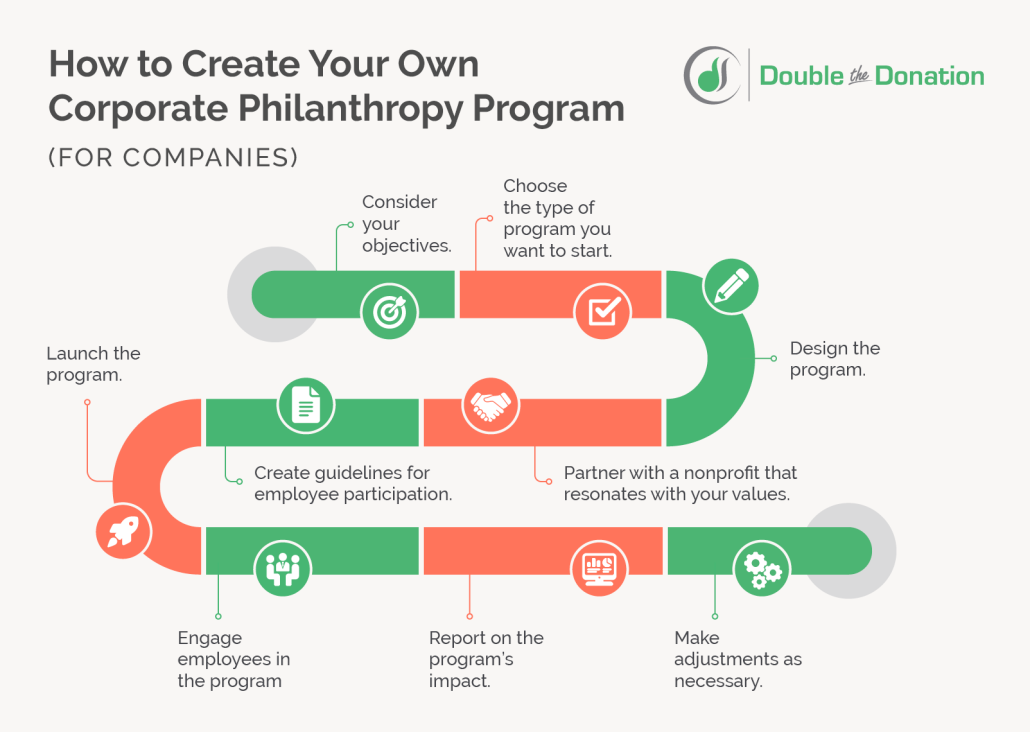15 lesser-known impacts corporate philanthropy transforms communities
Checking Out How Corporate Philanthropy Shapes Brand Online Reputation and Consumer Commitment
Corporate philanthropy significantly affects brand reputation and customer commitment. Firms that engage in authentic philanthropic initiatives commonly see a favorable change in just how consumers perceive them. This placement of worths fosters count on and psychological links with target markets. Nevertheless, the performance of these humanitarian initiatives can vary considerably. Recognizing what absolutely resonates with consumers is crucial for brands looking for to improve their social effect and market position. What strategies will arise as important for future success?
The Advancement of Business Philanthropy
As organizations progressively acknowledge their function in society, the development of corporate philanthropy has transformed from mere philanthropic donations to a calculated component of brand name identity. Companies engaged in philanthropy mostly for tax obligation advantages or to boost their public photo. In time, this approach changed as stakeholders-- including financiers, employees, and clients-- required a more authentic dedication to social responsibility.
Organizations began straightening their philanthropic campaigns with their core worths and business objectives, bring about even more thoughtful and impactful contributions. This adjustment has urged firms to buy sustainable methods and community advancement, promoting a feeling of function that resonates with customers.
In addition, technological advancements have actually promoted openness and interaction, permitting organizations to showcase their philanthropic initiatives better. Business philanthropy has actually arised as an essential part of company method, with organizations embracing the possibility to favorably affect culture while improving their general brand story.
The Impact of Philanthropy on Brand Perception
While companies take part in humanitarian efforts to promote social great, these efforts greatly shape brand name understanding among customers. Business philanthropy can improve a brand's photo by linking it with favorable social influence and community involvement. Consumers frequently view brand names that proactively get involved in philanthropic tasks as more trustworthy and responsible. This understanding can affect getting decisions, as customers may favor brands that show a dedication to social concerns.

Building Emotional Connections With Offering
Business philanthropy acts as a powerful tool for boosting brand name identity by linking business values with neighborhood demands. Through strategic offering, firms can promote community interaction and develop shared values that resonate with customers on a psychological degree. This approach not just enhances brand name reputation however additionally develops lasting links between organizations and their stakeholders.
Enhancing Brand Identity
When firms engage in kind initiatives, they not just add to social great however also build deeper psychological connections with their audiences. By straightening their brand name with philanthropic causes, companies boost their identity and signal values that reverberate with customers. This positioning produces a story that exceeds services and products, welcoming consumers to take part in a common goal. As customers progressively prioritize purpose-driven brands, firms that actively take part in providing can distinguish themselves in a congested market. Such initiatives cultivate a sense of commitment amongst customers who really feel directly connected to the brand's worths. Inevitably, business philanthropy comes to be a vital tool for boosting brand identity, cultivating enduring connections based on common ideas and emotional engagement.
Fostering Community Engagement
Numerous research studies indicate that business engaging in community-focused humanitarian campaigns can considerably enhance emotional links with their stakeholders. By buying neighborhood jobs and sustaining social reasons, businesses grow a sense of belonging and count on within the community. This engagement promotes a positive brand name image, as clients value business that show real problem for societal issues. Additionally, staff members commonly really feel extra inspired and honored to be related to a company that focuses on neighborhood welfare. Because of this, consumers are more probable to create commitment towards brand names that proactively add to purposeful causes. Inevitably, cultivating community engagement via philanthropy not just improves brand name track record however likewise develops enduring psychological ties that profit both the community and the company it offers.
Creating Shared Worths
Exactly how can services efficiently create shared worths that reverberate with their stakeholders? Business can achieve this by aligning their kind efforts with their core mission and the interests of their neighborhoods. By involving in campaigns that attend to regional requirements, companies foster psychological connections with consumers, improving brand name loyalty. For circumstances, partnering with non-profits that show shared worths strengthens the brand name's photo and shows dedication to social obligation. In addition, transparent communication regarding these initiatives allows stakeholders to see the substantial influence of their contributions. Eventually, by integrating shared worths into their business philanthropy, firms not only improve their track records yet also grow long lasting connections with clients, leading to boosted loyalty and trust. This placement is crucial in modern consumer decision-making.
Instance Researches: Successful Philanthropic Campaigns
Analyzing successful philanthropic projects discloses various strategies that enhance brand reputation. Impactful community efforts, ingenious collaboration designs, and long-term interaction methods have actually shown efficient in promoting favorable connections with customers. These situation studies highlight the significance of thoughtful business giving up achieving both social and service purposes.
Impactful Area Initiatives
Several firms have successfully leveraged philanthropic projects to enhance their brand credibility while making a significant effect in their areas. A technology firm introduced a digital literacy program in underserved areas, giving training and resources that encouraged local residents. This campaign not only added to neighborhood growth but likewise placed the firm as a socially accountable leader. Likewise, a significant food business implemented a hunger alleviation campaign, partnering with neighborhood nonprofits to distribute meals to family members in requirement. This effort strengthened area ties and promoted customer loyalty. With these impactful efforts, business have actually demonstrated their commitment to social duty, properly aligning their brand values with the needs of the communities they serve, eventually enhancing their general track record.
Innovative Partnership Designs
The success of impactful community initiatives frequently rests on ingenious partnership versions that combine diverse stakeholders to resolve facility social challenges. Instance researches illustrate just how companies, non-profits, and federal government entities can work together successfully. As an example, a multinational company partnered with a regional charitable to introduce an education and learning program, merging resources and knowledge to improve community literacy rates. blog One more example included a technology firm and a health care organization signing up with forces to create a telemedicine remedy for underserved populaces. These collaborations not only enhanced the reach of kind initiatives but additionally strengthened the brand names' online reputations by straightening their goals with area requirements. Ultimately, innovative collaboration designs function as a stimulant for purposeful change and foster more powerful links between brands and their consumers.
Lasting Engagement Techniques

Measuring the ROI of Company Social Obligation
As companies increasingly buy business social obligation (CSR) efforts, understanding the return on investment (ROI) linked with these initiatives comes to be necessary. Measuring ROI in CSR is complex, usually encompassing both quantitative and qualitative metrics. Monetary returns can be analyzed through increased sales, improved brand name loyalty, and improved employee morale, which can bring about greater performance. In addition, business might examine price financial savings linked to lasting methods, such as minimized waste or energy usage.
Qualitatively, the impact of CSR on brand name track record can be examined with customer assumption researches and social media sites belief analysis. Studies can offer understandings right into just how CSR tasks influence consumer loyalty and depend on. Additionally, benchmarking against sector standards can help organizations determine their CSR efficiency. Ultimately, a comprehensive approach to gauging ROI allows firms to make enlightened choices regarding future CSR financial investments, straightening approaches with both monetary efficiency and social impact
Customer Assumptions and Business Obligation
Significantly, customers expect firms to operate with a solid sense of corporate duty, checking out moral techniques as a requirement for brand loyalty. This change in assumption mirrors an expanding understanding of social and ecological concerns, leading consumers to prefer brands that line up with their worths. Consumers are extra likely to support companies that engage in check this transparent practices, demonstrate sustainability, and contribute positively to their areas.
Social media enhances these expectations, enabling consumers to share their point of views and experiences swiftly. Brands that stop working to meet these honest criteria risk backlash, while those that accept company obligation typically enjoy superior credibility and client loyalty. As consumers require accountability, business must integrate business social obligation into their core methods, prioritizing honest habits not equally as a marketing method, however as a fundamental aspect of their procedures. This alignment can ultimately cause stronger brand name fondness and continual success in affordable markets.
Future Patterns in Business Philanthropy and Brand Loyalty
The landscape of company philanthropy is evolving, influenced by the increased customer expectations surrounding company duty. Business are increasingly integrating social impact into their core service methods, not simply as a secondary task. Future trends indicate a change towards openness, with brand names sharing detailed info regarding their kind campaigns and their straight impacts on neighborhoods.
Innovation is playing a crucial duty, enabling real-time interaction in between brands and consumers. Social media platforms help with direct interaction, permitting customers to articulate their expectations and hold brands responsible. In addition, more youthful generations, specifically Millennials and Gen Z, focus on sustainability and moral practices, driving businesses to take on more conscientious methods.
As business philanthropy becomes identified with brand name identity, companies that authentically straighten their goals with societal demands are likely to cultivate more powerful consumer loyalty. This convergence of worths will ultimately form the future of company track record and consumer partnerships in an increasingly diligent marketplace.
Often Asked Concerns
How Do Consumers Discover a Firm's Philanthropic Efforts?
Consumers find a business's philanthropic initiatives with numerous networks, consisting of social media, news release, neighborhood events, and word-of-mouth. These avenues promote recognition, enabling people to engage with brands that straighten with their rate of interests and worths.
What Duty Does Employee Involvement Play in Corporate Philanthropy?
Worker participation in business philanthropy boosts engagement, cultivates a sense of ownership, and reinforces group communication - corporate philanthropy. This engagement often amplifies the influence of charitable efforts, bring about higher awareness and support for the business's kind efforts
Can Corporate Philanthropy Backfire on a Brand's Reputation?
If perceived as opportunistic or insincere, business philanthropy can indeed backfire on a brand's track record. Adverse public assumption might arise, bring about decreased trust fund and commitment amongst consumers that prioritize credibility in business activities.
Are Smaller Firms as Effective in Philanthropy as Larger Corporations?
Smaller sized firms can be equally effective in philanthropy as larger firms, frequently showing dexterity and authenticity. Their localized initiatives might reverberate extra deeply with neighborhoods, cultivating authentic links in spite of limited sources contrasted to their larger counterparts.
How Can Business Select the Right Causes to Assistance?
Companies can select the right trigger by aligning their worths with area requirements, evaluating stakeholder rate of interests, and assessing possible impact. This critical method promotes credibility, boosts engagement, and reinforces connections with clients and the more comprehensive community.
While companies involve in kind efforts to promote social excellent, these campaigns considerably form brand assumption among customers. As customers significantly focus on purpose-driven brand names, companies that proactively involve in offering can differentiate themselves in a crowded market. Many firms have successfully leveraged philanthropic projects to improve their brand track record while making a significant effect in their communities. Increasingly, consumers expect firms to check that operate with a strong sense of business duty, checking out ethical practices as a prerequisite for brand loyalty. As business philanthropy becomes synonymous with brand identity, business that authentically align their objectives with social needs are most likely to promote more powerful client commitment.